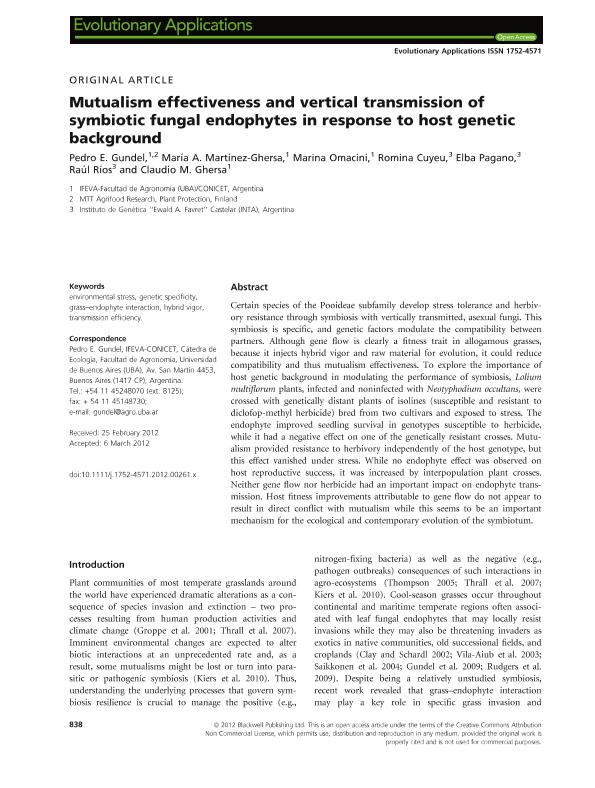Artículo
Mutualism effectiveness and vertical transmission of symbiotic fungal endophytes in response to host genetic background
Gundel, Pedro Emilio ; Ghersa, Claudio Marco
; Ghersa, Claudio Marco ; Omacini, Marina
; Omacini, Marina ; Cuyeu, Romina; Pagano, Elba Maria; Ríos, Raúl; Ghersa, Claudio Marco
; Cuyeu, Romina; Pagano, Elba Maria; Ríos, Raúl; Ghersa, Claudio Marco
 ; Ghersa, Claudio Marco
; Ghersa, Claudio Marco ; Omacini, Marina
; Omacini, Marina ; Cuyeu, Romina; Pagano, Elba Maria; Ríos, Raúl; Ghersa, Claudio Marco
; Cuyeu, Romina; Pagano, Elba Maria; Ríos, Raúl; Ghersa, Claudio Marco
Fecha de publicación:
12/2012
Editorial:
Wiley Blackwell Publishing, Inc
Revista:
Evolutionary Applications
ISSN:
1752-4571
Idioma:
Inglés
Tipo de recurso:
Artículo publicado
Clasificación temática:
Resumen
Certain species of the Pooideae subfamily develop stress tolerance and herbivory resistance through symbiosis with vertically transmitted, asexual fungi. This symbiosis is specific, and genetic factors modulate the compatibility between partners. Although gene flow is clearly a fitness trait in allogamous grasses, because it injects hybrid vigor and raw material for evolution, it could reduce compatibility and thus mutualism effectiveness. To explore the importance of host genetic background in modulating the performance of symbiosis, Lolium multiflorum plants, infected and noninfected with Neotyphodium occultans, were crossed with genetically distant plants of isolines (susceptible and resistant to diclofop-methyl herbicide) bred from two cultivars and exposed to stress. The endophyte improved seedling survival in genotypes susceptible to herbicide, while it had a negative effect on one of the genetically resistant crosses. Mutualism provided resistance to herbivory independently of the host genotype, but this effect vanished under stress. While no endophyte effect was observed on host reproductive success, it was increased by interpopulation plant crosses. Neither gene flow nor herbicide had an important impact on endophyte transmission. Host fitness improvements attributable to gene flow do not appear to result in direct conflict with mutualism while this seems to be an important mechanism for the ecological and contemporary evolution of the symbiotum. © 2012 Blackwell Publishing Ltd.
Archivos asociados
Licencia
Identificadores
Colecciones
Articulos(IFEVA)
Articulos de INST.D/INV.FISIOLOGICAS Y ECO.VINCULADAS A L/AGRIC
Articulos de INST.D/INV.FISIOLOGICAS Y ECO.VINCULADAS A L/AGRIC
Citación
Gundel, Pedro Emilio; Ghersa, Claudio Marco; Omacini, Marina; Cuyeu, Romina; Pagano, Elba Maria; et al.; Mutualism effectiveness and vertical transmission of symbiotic fungal endophytes in response to host genetic background; Wiley Blackwell Publishing, Inc; Evolutionary Applications; 5; 8; 12-2012; 838-849
Compartir
Altmétricas



